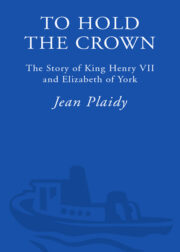The Cornishmen themselves—the humble artisans from Bodmin—should have a free pardon. They could go back to their remote town and talk of the benevolence of the King.
The leaders should not get off so freely. Men like Flammock and Joseph were dangerous. Moreover, but for them this disturbing affair would not have taken place.
The people must be shown that the Flammocks and Josephs among them were dangerous men to follow. This time, because the King was merciful they had been forgiven and had escaped the punishment they deserved—but it must not happen again.
Audley was considered the chief offender. It was men such as he who were the real danger. He forgot his position in the country when he placed himself at the head of a rabble and he must pay the penalty. He was brought before the King and condemned to death. As he was a nobleman he should be beheaded and not suffer the barbarous penalty which befell low-born traitors, but he must be shamed first. He was put into a paper coat, which showed that he had been stripped of his knighthood, being no longer worthy of it, and was led from Newgate to Tower Hill where the executioner with his axe was waiting for him.
When his head was separated from his body it was stuck on London Bridge—a warning to all who thought they might play the traitor.
Flammock and Joseph were less fortunate. They suffered the traitor’s death. They were taken to Tyburn where they were hanged, drawn and quartered; and their limbs were displayed in various parts of the city.
This was what happened to traitors, those who in moments of folly lightly undertook to plot against the King.
Henry was satisfied. He had dealt with the matter in his usual calm way; and no one could say he had been unduly harsh.
Many a king would have slaughtered hundreds of them. But not Henry. He could always calmly decide what was best for Henry Tudor, and that was not to murder for murder’s sake. He did not want to do so for revenge even. He was rarely in a hot rage about any matter and therefore always had time to calculate which would be the most advantageous way to act.
Reluctantly he had decided on the traitor’s death for the three ringleaders. He must give no one an impression of weakness. No. He was not weak. He was stern perhaps, but just—always just.
He could congratulate himself that he had dealt very properly with the Cornish rebels.
There still remained Perkin Warbeck to haunt his days and turn pleasant dreams into nightmares.
James was growing rather tired of Perkin Warbeck. The expedition into England had shown clearly that the people were not going to flock to his banner, and James was not going to beggar himself by supporting another man’s cause—and a possible King of England at that! No, indeed not. Perkin must fight his own battles and the more thought James gave to the matter the more it seemed to him that it would be better for Perkin to fight somewhere which did not involve Scotland.


"To Hold the Crown: The Story of King Henry VII and Elizabeth of York" отзывы
Отзывы читателей о книге "To Hold the Crown: The Story of King Henry VII and Elizabeth of York". Читайте комментарии и мнения людей о произведении.
Понравилась книга? Поделитесь впечатлениями - оставьте Ваш отзыв и расскажите о книге "To Hold the Crown: The Story of King Henry VII and Elizabeth of York" друзьям в соцсетях.